facts about chickens
Chicken-brained. Scared as a chicken. The insults are clear – people have a low opinion of our feathered friends. Chickens are spunky, smart, sensible creatures with a fascinating social life.
chickens are social
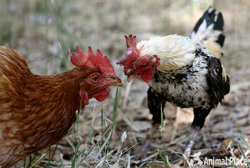
Within a flock are many subgroups, indicating a more complex social structure than the simplified "pecking order" paradigm. Chickens can be generous and selfish, expressing complicated emotions once thought the domain of humans and other primates. Close friends will groom each other or choose to sunbath or dust bathe together. In the evening, as the chickens start roosting, grudges from earlier in the day are ignored in favor of sharing warmth.
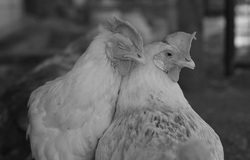
Animal Place Profile - Lilac and Daisy
Rescued from two different battery-cage egg farms, Lilac and Daisy show that chickens can form friendships and bonds. After her arrival, Lilac developed eye problems that left her partially blind. Weaker birds are not always treated well by other birds. Lucky for Lilac, she had Daisy. When necessary, Lilac would lean against Daisy, seeking comfort and support. Daisy would slowly walk to the feeding station with Lilac close by her side.
Rescued from two different battery-cage egg farms, Lilac and Daisy show that chickens can form friendships and bonds. After her arrival, Lilac developed eye problems that left her partially blind. Weaker birds are not always treated well by other birds. Lucky for Lilac, she had Daisy. When necessary, Lilac would lean against Daisy, seeking comfort and support. Daisy would slowly walk to the feeding station with Lilac close by her side.
chickens have a complex system of communication
Chickens rely on a repertoire of calls or "words" that convey complex ideas and emotions. They have a unique cry for aerial, mammalian, and reptilian (snakes) predators. Hens speak to their chicks in ovo and as hatching time gets closer, the chicks respond back - they will recognize their unique mother's voice upon hatching. Roosters have a "come here, I have food" call, hens a protective growl, and both sexes use a unique chicken purr to convey contentment. Much of their communication remains a mystery with at least 20 unique "words" already known.
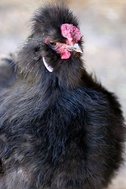
Animal Place Profile - Ferdie The Liar
Deception is an intelligent behavior. Ferdie uses his "I have food" call to lure hens over (usually to try and mate)...but he doesn't have food to share. Hens learn quickly, ignoring his particular calls in the future. He must wait for new hens before trying this ploy again (and he won't make the call around more dominant roosters). When a human researcher discovered this behavior and published an article, reporters at press conference replaced "rooster" with "monkey", so certain no one would believe the "lowly" chicken capable of such complexity.
Deception is an intelligent behavior. Ferdie uses his "I have food" call to lure hens over (usually to try and mate)...but he doesn't have food to share. Hens learn quickly, ignoring his particular calls in the future. He must wait for new hens before trying this ploy again (and he won't make the call around more dominant roosters). When a human researcher discovered this behavior and published an article, reporters at press conference replaced "rooster" with "monkey", so certain no one would believe the "lowly" chicken capable of such complexity.
chickens have an advanced visual system
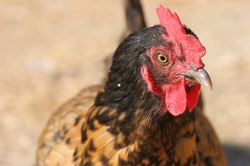
Chickens have superior visual acuity and color perception than mammals, including humans. They see in full color and are able to see ultraviolet and infrared light waves. A specialized receptor helps detect movement, a reason why chickens are so attracted to the slightest motion in their environment.
Roosters crow at any time of the day but one of the reasons they crow early in the morning is their ability to see the infrared light waves of the sun rising, which can be seen sooner than our eyes can detect it.
Roosters crow at any time of the day but one of the reasons they crow early in the morning is their ability to see the infrared light waves of the sun rising, which can be seen sooner than our eyes can detect it.
chickens love baths
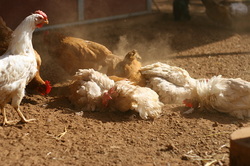
But not just any kind of bath – dust and sunbaths! Chickens love to roll around in the dirt, but not to get dirty. Dustbaths help protect birds from parasites. Chickens also love stretching languorously in the sun, soaking up the rays. Sunbaths help absorb Vitamin-D, keeping chickens healthy and happy. Chickens seem to simply enjoy sunbaths too; it's also a time to socialize with flockmates.
The hens in this photo lived in a cage for two years and yet that innate drive to dust-bathe never goes away.
The hens in this photo lived in a cage for two years and yet that innate drive to dust-bathe never goes away.

